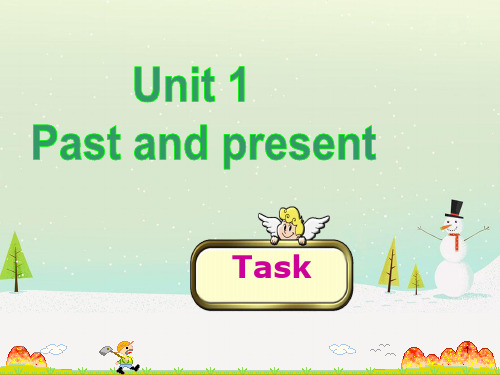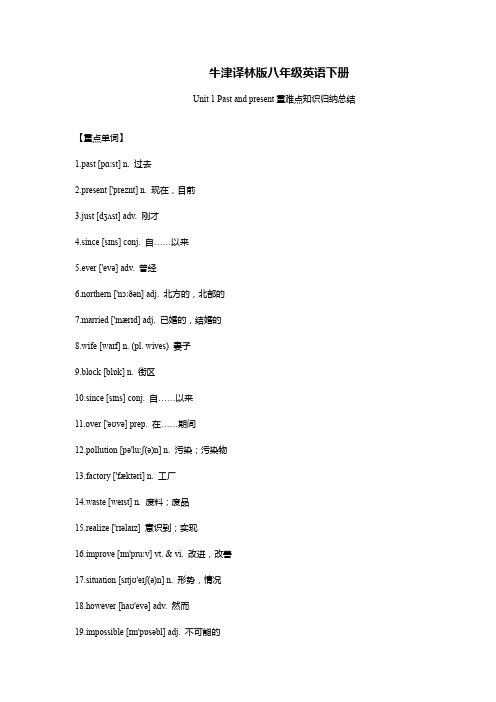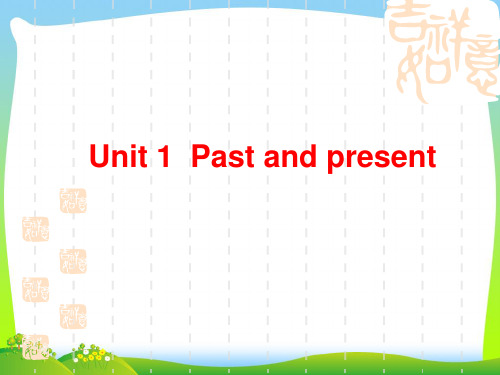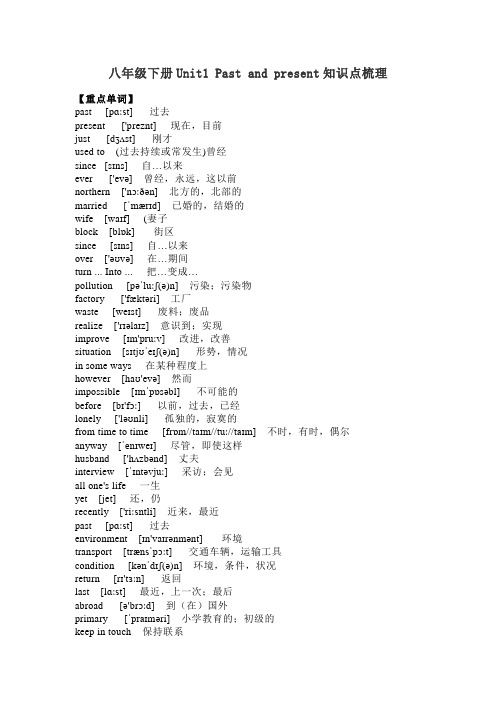八年级英语下册 Unit 1 Past and present Comic Pictures & Welcome to the unit教案 牛津版
八年级英语下册 Unit 1 Past and present Comic strip (5)

Many changes have taken place in…
13
Environment
Paragraph2
In the past , there were only narrow and dirty roads in the small town. There was rubbish. But now the streets are wide and clean, with many green trees on both sides. The government has also built shops and tall buildings in some large open space.
2-4
Transport
Paragraph5 Conclusion → Opinion
19
Discussion: How to write a report about the changes in your…
You should divide the report into five paragraphs
Useful expressions
In the past, people traveled around the town by…, but now they can go aground by… Many families even have…
16
Conclusion (opinion)
Paragraph5
Task
1
➢ To learn to write a report on the changes in your hometown
➢To learn the new words and phrases: narrow, open space, large open spaces, in their free time
英语Unit1PastandpresentComicPicturesWelcometotheunit教案(牛津英语八年级下)

Unit 1 Past and presentComic Pictures & Welcome to the unit本课时基本任务1.介绍本单元的主题:现在与过去2.学习不同时期有关交通工具的单词本课时必会单词:present, just, Light Rail, MTR, ferry, tram, since,本课时必会词组:an hour ago, be hungry, be kind, be so bad, want to do sth., play with sb., not…an y more本课时要了解的句型:1.It was in the bowl an hour ago.2.Because I was very hungry.3.You were kind.4.You always wanted to play with me.5.Have you seen my food?6.I’ve just eaten it.I. Lead-inTeacher says, ‘Hello, everybody! We haven’t seen each other f or a long time. Were you happy in winter holidays? Did you have a good time? What festival did you celebrate? Where did you go? What did you do? What did you eat? What food is your favourite?’II. Pre-taskTeacher says,‘My favourite food is chocolate. Because it smells nice and it tastes sweet and delicious, what’s more, it looks lovely and beautiful. Today I took a piece of chocolate here. I want to send it to someone clever. Oh, where is my chocolate? It was in my pocket an hour ago.’Teacher asks Ss,Have you seen my chocolate? --------No, I haven’t.Would you like to help me remember where it is?Ss guess Teacher saysMaybe you have put it in your bag. ---------No, I haven’t.Maybe you have put it in your book. ---------Yes, I have. How cleveryou are! I will send it to you.III. While-taskTask 1: Teacher asks,Do you still remember Hobo and Eddie?How are they this term?What are they talking about now?Let’s listen to the tape. (play the tape for the Ss to listen to the dialogue between Hobo and Eddie.) Task 2: Ask some questions about it:1. Where is Hobo’s food?2. Why did Eddie eat food?3. Is Hobo happy?4. What does Hobo think of Eddie?Task 3: Explain the important phrases and sentences in the dialogue.Phrasesan hour ago, be hungry, be kind, be so bad, want to do sth, play with sb., not…any more Sentences1. It was in the bowl an hour ago .2. Because I was very hungry.3. You were kind.4. You always wanted to play with me.5. Have you seen my food?6. I’ve just eaten it.7. You’ve eaten my food.Task 4: Work in pairs and drill the dialogue.Task 5: Ask some Ss to act the dialogue out, then do the exercise.Hobo’s food _______ in the _______ an hour ago. But it isn’t there now. Why? Eddie has just _______ it because he is ________. Hobo thinks Eddie has _______ and he is _______ bad now. He doesn’t w ant to _______ with Eddie any ________.Task 6: Teacher asks,Eddie and Hobo both think they have changed a lot. There are also many changes in our life. How did you come to school today?Do you know other different forms of transport?Task 7: Welcome to the unit.Show some pictures of the the different forms of transport.Ask the Ss to fill in the blanks with the correct names. Then check the answers.Task 8Read the following sentences and ask the students to guess which mode of transport you are describing.1. It has traveled across Victoria Harbour, between Hong Kong Island and Kowloon since1898. (ferry)2. It’s an easy way to get to the op of the peak. (peak tram)3.There are many of them. Each one has wheels and takes you to many places in and aroundHong Kong. (bus)4. It has provided transport service for people living in the north-west New Territories since1988. (light rail)5. It is the fastest way of traveling and was introduced to Hong Kong in 1925. (plane)6. Thousands of people travel to work on it every day. (underground)IV. Post-task1. Talk about the transport at different times in Hong Kong using the sentence:There has been … since ….2. Read the context of Part A and expand on it to create interest. Link it to personal experiences and talk about the usefulness, convenience and efficiency of different modes of travel. V. Homework1. Recite the sentences of the comic pictures.2. 翻译下列词组在碗中不再和……一起玩家乡学习更多的在过去的二十年中香港的变化一项历史计划上列词组的正确形式填空1) __________, the transportation has changed a lot in Nanjing.2) I did badly in my test. Now I ____ play computer games _____.3) Could you tell me some ________________?4) Lily is making ______ on the changes on her ___________?5) Jim likes to __ Ann. They have the same hobby of playing chess.6) Kitty likes traveling. She wants _________ the geography.7) Can you tell me where my food is? It’s _________.3. 你知道南京交通工具的演变过程吗?你能说出多少呢?第三—四课时Reading本课时基本任务1. 阅读关于九龙岛的变迁。
牛津译林版八年级英语下册Unit 1 Past and present 重难点知识归纳总结

牛津译林版八年级英语下册Unit 1 Past and present重难点知识归纳总结【重点单词】1.past [pɑːst] n. 过去2.present ['preznt] n. 现在,目前3.just [dʒʌst] adv. 刚才4.since [sɪns] conj. 自……以来5.ever ['evə] adv. 曾经6.northern ['nɔːðən] adj. 北方的,北部的7.married ['mærɪd] adj. 已婚的,结婚的8.wife [waɪf] n. (pl. wives) 妻子9.block [blɒk] n. 街区10.since [sɪns] conj. 自……以来11.over ['əʊvə] prep. 在……期间12.pollution [pə'luːʃ(ə)n] n. 污染;污染物13.factory ['fæktəri] n. 工厂14.waste [weɪst] n. 废料;废品15.realize ['rɪəlaɪz] 意识到;实现16.improve [ɪm'pruːv] vt. & vi. 改进,改善17.situation [sɪtjʊ'eɪʃ(ə)n] n. 形势,情况18.however [haʊ'evə] adv. 然而19.impossible [ɪm'pɒsəbl] adj. 不可能的20.before [bɪ'fɔː] adv. 以前,过去,已经21.lonely ['ləʊnli] adj. 孤独的,寂寞的22.anyway ['enɪweɪ] adv. 尽管,即使这样23.husband ['hʌzbənd] n. 丈夫24.interview ['ɪntəvjuː] n. 采访;会见25.yet [jet] adv. 还,仍26.recently ['riːsntli] adv. 近来,最近27.past [pɑːst] n. 过去28.environment [ɪn'vaɪrənmənt] n. 环境29.transport [træns'pɔːt] n. 交通车辆,运输工具30.condition [kən'dɪʃ(ə)n] n. 环境,条件,状况31.return [rɪ'tɜːn] vi. 返回st [lɑːst] adv. 最近,上一次;最后33.abroad [ə'brɔːd] adv. 到(在)国外34.primary ['praɪməri] adj. 小学教育的;初级的municate [kə'mjuːnɪkeɪt] vi.& vt. 交流,交际munication [kəmjuːnɪ'keɪʃ(ə)n] n. 交流,交际37.exactly [ɪg'zæktli] adv.(答语)正是,没错38.narrow ['nærəʊ] adj. 狭窄的【重点短語】ed to (用于过去持续或经常发生的事)曾经2.turn ... into ... 把……变成……3.from time to time 不时,有时,偶尔4.in some ways 在某种程度上5.all one’s life 一生6.keep in touch 保持联系7.be/get used to 习惯于,适应于8.open space 开阔的空地9.in the north of town在镇子的北边10.get married 结婚11.move two blocks away 搬到两个街区外12.since then 自从那时13.change a lot 变化很大14.over the years 在这几年里15.put the waste into the river 把废料倒进河里16.realize the problem 意识到这个问题17.improve the situation 改善现状18.much cleaner 更干净了19.as often as before 和之前一样频繁20.feel a bit lonely 感觉有点孤独21.travel to and from the town 往返城镇22.go abroad出国23.narrow and dirty roads 狭小肮脏的街道24.enjoy a comfortable life 享受舒适的生活【重点句型】1.You’ve changed too. You used to be so kind to me.你也变了。
【最新】牛津译林版八年级英语下册Unit 1 Past and Present课件2.ppt

Market stalls have turned into shopping malls.
People used to buy things at market stalls. Now they go to shopping malls instead.
1. The government has changed ___C___ into a park.
A. some small restaurants B. shops & market stalls C. a small post office & an old cinema D. a large shopping centre & a theatre
4. Mr Chen moved out of Sunshine Town when he got married. ( F )
5. In the past, 30,000 people lived in SunshineTown.( T)
6. Mr Chen and his old friends meet in the new park to play cards and Chinese chess. ( T )
in Sunshine Town * Mr. Chen’s _i_d_e_a_s_
about the changes in Sunshine Town.
Part 1 Read ( Line 1~9 )
Where did Mr. Chen live?
Before 1965
He lived near Sunshine River in the southern part of town with his parents.
最新牛津译林版八年级英语下册 Unit 1 Past and Present welcome to the Unit精品课件

bike, bus, taxi, car, 最tr新ai初n中, u英n语d精er品g课ro件u设n计d, plane, coach, ship….
Transport has changed in Beijing.
people used to walk or ride a bike.
used to do sth. 过去常常做某事
最新初中英语精品课件设计
What transport do we use at present?
train
underground
Read and answer:
1. Why didn’t Millie’s Dad go to school by bus?
Because there were too many people on the bus, 2. Haas tnhde biuts cthoaongkedaovleornthgetyeimarse? to wait for the next one.
Both Eddie and Hobo have changed .
最新初中英语精品课件设计
•在碗里 •过去常常做... •和我分享食物 •对我如此的友好 •太多的人 •等某人/某事 •做...花费...时间
•in the bowl •used to do •share food with me •be so kind to me •too many people •wait for sb./sth. •it takes some time to do sth.
最新初中英语精品课件设计
牛津译林版 8B八年级下册 Unit1 Past and present 知识点梳理

八年级下册Unit1 Past and present知识点梳理【重点单词】past [pɑːst]过去present ['preznt] 现在,目前just [dʒʌst] 刚才used to (过去持续或常发生)曾经since [sɪns] 自…以来ever ['evə] 曾经,永远,这以前northern ['nɔːðən] 北方的,北部的married [ˈmærɪd] 已婚的,结婚的wife [waɪf] (妻子block [blɒk] 街区since [sɪns] 自…以来over ['əʊvə] 在…期间turn ... Into ... 把…变成…pollution [pəˈluːʃ(ə)n] 污染;污染物factory ['fæktəri] 工厂waste [weɪst] 废料;废品realize ['rɪəlaɪz] 意识到;实现improve [ɪm'pruːv]改进,改善situation [sɪtjʊˈeɪʃ(ə)n] 形势,情况in some ways 在某种程度上however [haʊ'evə] 然而impossible [ɪmˈpɒsəbl] 不可能的before [bɪ'fɔː]以前,过去,已经lonely ['ləʊnli] 孤独的,寂寞的from time to time [frɒm//taɪm//tuː//taɪm] 不时,有时,偶尔anyway [ˈenɪweɪ] 尽管,即使这样husband ['hʌzbənd] 丈夫interview [ˈɪntəvjuː]采访;会见all one's life 一生yet [jet] 还,仍recently ['riːsntli]近来,最近past [pɑːst]过去environment [ɪn'vaɪrənmənt] 环境transport [trænsˈpɔːt]交通车辆,运输工具condition [kənˈdɪʃ(ə)n] 环境,条件,状况return [rɪ'tɜːn]返回last [lɑːst]最近,上一次;最后abroad [ə'brɔːd]到(在)国外primary [ˈpraɪməri] 小学教育的;初级的keep in touch 保持联系communicate [kəˈmjuːnɪkeɪt] 交流,交际communication [kəmjuːnɪˈkeɪʃ(ə)n] 交流,交际exactly [ɪg'zæktli] (答语)正是,没错be/get used to 习惯于,适应于narrow [ˈnærəʊ] 狭窄的open space 开阔的空地【重点词组】1.in the bowl an hour ago一个小时之前在碗里的ed to do sth.过去常常做某事be used to doing sth. 习惯于做某事be used to do sth. 被用来做某事3.do a history project on the changes in Beijing over the years做个有关这些年北京的变化的历史调查4.write a report on the changes in your home town 写一个有关你家乡的变化的报道5.know about the different forms of transport 对不同形式的交通工具很了解6.talk about transport at different times 讨论不同时期的交通工具7.take turns to do sth.=do sth. by turns 轮流做某事8.go to school by bike = ride a bike to school 骑自行车去学校9.wait for the next one 等下一辆车10.go to school by bus= take a bus to school= go to school on the bus乘公交车去学校11.interview sb. to get some information 为了得到些信息采访某人12.know sunshine town very well 对阳光镇很了解13.be born 出生14.move house 搬家15.in the northern part of town 在这个镇的西部16.get married to sb.= marry sb.= be married to sb.和某人结婚17.marry sb. to sb. 把某人嫁给某人18.move two blocks away搬到两个街区以外19.live in this area 住在这个地区20.since then 自从那以后since I was born/ since last Saturday/since three days ago21.over the years 这些年over the past century 在过去的几个世纪22.in the town centre= in the centre of the town 在镇中心23.turn/change/put sth. into 把某物变成某物24.a steel factory 一个钢铁厂25.put the waste into the river 把垃圾倒入河里put down 记下put away 收好put on 穿上put off 推迟、延期26.take action to improve the situation采取行动改善这种情况27.in some ways 在某些方面on the way (to ) 在……的路上by the way 顺便说no way 没门in any way 无论如何28.most of my old friends大部分我的老朋友29.move away 搬走/move to(into) another town30.see each other as often as before像以前一样经常看到对方31.play cards and Chinese chess 打牌和下棋32.feel a bit lonely 感到有点孤单33.from time to time = at times = sometimes 有时34.because of being alone 因为独自一人35.a group of buildings with streets on all sides街道两边全是高楼on both sides/ on each side36.interview sb.= have an interview with sb. 采访某人37.all his life 整个他的一生38.in the past 在过去at present 现在39.make some notes 做些笔记40.waste sth. on sth./ sb.浪费某物在某物/某人上41.repair over ten bicycles= repair more than ten bicycles修理超过10辆自行车42.teach sb. a lot about the history of China教我很多有关中国的历史43.talk about a film about the history of Beijing讨论一个有关北京历史的影片44.learn more about Beijing’s past and present对北京的过去和现在了解更多45.hear about/of 听说hear from sb.= receive/ get one’s letter=receive/get a letter of sb.收到某人来信46.living conditions 居住条件47.return sth. to sb. 把某物归还给某人48.go abroad 去国外at home or abroad 在国内外49.at primary school 在小学50.keep in touch with each other 互相保持联系51.make communication much easier使得联系更容易Communicate with sb.和某人保持联系52.take place发生(有目的有计划的)、举行happen发生(偶然发生)53.green hills all around到处都是绿山54.a river runs through the centre of town一条小河穿过镇中心55.get used to the changes of life习惯了生活的变化56.on one’s own = by oneself = alone独自57.throw rubbish 扔垃圾58.in some large open spaces在一些大的开阔的地方59.move into new flats搬到新公寓去60.in their free time在他们业余时间61.travel around the town在镇里转转62.have their own cars= have cars of their own有他们自己的汽车e the new words to talk about my hometown用些新词来讨论我的家乡e facts to support my opinions用事实来支持我的观点【重点句型】1.There were always too many people on the bus, and it took a long time to wait for the next one.公共汽车上总是有太多的人,并且要花费很长时间等待下一趟。
八年级英语下册Unit1PastandPresent(StudySkills)课件(新版)牛津版
Thank you!
Facts are true statements. They include names, dates, events and numbers.
Nanjing is a busy city.
The shopping malls are good places to have fun.
People enjoy a comfortable life in Nanjing.
amazing changes in the town.
Homework
1. Finish the exercises in the Workbook. 2. Write something about your desk mate and try to use
the facts to support your opinions.
3. When I was at primary school, I walked to
school with my mum. F 4. Now I go to school by bus on my own. F 5. I have to spend more time on my homework than before. F 6. Some subjects are difficult. O
We can eat different snacks in Nanjing.
People can travel with different transport in Nanjing.
There are many parks in Nanjing.
What do you think of Nanjing? Nanjing is a busy city. The shopping malls are good places to have fun. People enjoy a comfortable life in Nanjing.
初中英语 牛津译林八下Unit1知识梳理
牛津译林八下Unit1知识梳理Comic strip &Welcome to the unit1:past and present(1)past①n. 过去,以前;in the past 在过去In the past, there was no underground in Nanjing.People lived a hard life in the past.②adj. 过去的,以前的;in/over/during the past/last few years 在过去的几年里常用于现在完成时Let’s not make the past mistakes.He has visited many foreign countries in the past few years.③prep. 过half past ten 十点半Our car was past the Tian’anmen Square when it broke down.④adv. 经过go/walk/run/ride/drive/swim past sp. = pass sp.A woman saw it happen when she walked past.When I walk past the post office, I see a bird flying over the tree.(2)present①adj.现在的; 目前的; 出席的be present at the meeting 出席会议②n.现在; 礼物; at present 现在; a present for you=a gift for you给你的礼物He is busy at present.③vt.介绍; 出现; 提出; 赠送; present sb. with sth.Everyone can be present ed a present at present.2:You’ve changed, Eddie. You used to share food with me.你变了。
八年级英语下册Unit1PastandPresent第2课时课件新版牛津版
Class Exercise
1)对……了解 2)结婚 3)搬出 5)在…中心 6)感到孤独 7)变成 9)过去常常做…... 10)在某种程度上
4)水污染 8)不时地
Class Exercise(二)
• 用所给单词的适当形式填空。 •来自1. Have you ever_______ (write) a letter to your parents? • 2. The noise was terrible. It made people very_______ (comfortable). • 3. Most of the_______ (wife) do housework at home. • 4. It's_______ (polite) to leave without saying 'Goodbye' to teachers. • 5. Shenzhen is in the_______(south) part of China.
Uint 1 Past and present (Reading1)
Leaning aims:
• 1.Learn to talk about Beijing’s Past and present • 2. learn the new words and phrases
Guide One (8’)
Guide Two
(9’)
• Please read Reading again and finish C1 and C2 it within five minutes. • Have a match! Who can do it best?
Guide There
• Listen to the tape and finish the following table within 5 minutes. • Have a match! Who can do it best?
八年级英语下册Unit1PastandPresent课时1ComicstripWeletotheun
B: ___F___18 A: Oh, my parents found
good jobs in Shanghai 5 years ago, so we moved there.
A. Hope you can be my tour guide then.
B. What’s up? C. Mike? Are you Mike? D. Finally you will like pandas. E. I know China is the country famous
for its pandas. F. Where have you been these years? G. I just sat behind you in high school.
pandas very much.
E. I know China is the country famous
B: Pandas are so cute that
for its pandas.
they are always my
F. Where have you been these years?
favorite animals.
B. What’s up? C. Mike? Are you Mike? D. Finally you will like pandas. E. I know China is the country famous
for its pandas. F. Where have you been these years? G. I just sat behind you in high school.
- 1、下载文档前请自行甄别文档内容的完整性,平台不提供额外的编辑、内容补充、找答案等附加服务。
- 2、"仅部分预览"的文档,不可在线预览部分如存在完整性等问题,可反馈申请退款(可完整预览的文档不适用该条件!)。
- 3、如文档侵犯您的权益,请联系客服反馈,我们会尽快为您处理(人工客服工作时间:9:00-18:30)。
Unit 1 Past and presentComic Pictures & Welcome to the unit本课时基本任务1.介绍本单元的主题:现在与过去2.学习不同时期有关交通工具的单词本课时必会单词:present, just, Light Rail, MTR, ferry, tram, since,本课时必会词组:an hour ago, be hungry, be kind, be so bad, want to do sth., playwith sb., not…an y more本课时要了解的句型:1.It was in the bowl an hour ago.2.Because I was very hungry.3.You were kind.4.You always wanted to play with me.5.Have you seen my food?6.I’ve just eaten it.I. Lead-inTeacher says, ‘Hello, everybody! We haven’t seen each other f or a lon g time. Wereyou happy in winter holidays? Did you have a good time? What festival did youcelebrate? Where did you go? What did you do? What did you eat? What food is yourfavourite?’II. Pre-taskTeacher says,‘My favourite food is chocolate. Because it smells nice and it tastes sweet anddelicious, what’s more, it looks lovely and beautiful. Today I took a piece ofchocolate here. I want to send it to someone clever. Oh, where is my chocolate? Itwas in my pocket an hour ago.’Teacher asks Ss,Have you seen my chocolate? --------No, I haven’t.Would you like to help me remember where it is?Ss guess Teacher saysMaybe you have put it in your bag. ---------No, I haven’t.Maybe you have put it in your book. ---------Yes, I have. How clever you are! I will send it to you.III. While-taskTask 1: Teacher asks,Do you still remember Hobo and Eddie?How are they this term?What are they talking about now?Let’s listen to the tape. (play the tape for the Ss to listen to the dialogue betweenHobo and Eddie.)Task 2: Ask some questions about it:1. Where is Hobo’s food?2. Why did Eddie eat food?3. Is Hobo happy?4. What does Hobo think of Eddie?Task 3: Explain the important phrases and sentences in the dialogue.Phrasesan hour ago, be hungry, be kind, be so bad, want to do sth, play with sb., not…any moreSentences1. It was in the bowl an hour ago .2. Because I was very hungry.3. You were kind.4. You always wanted to play with me.5. Have you seen my food?6. I’ve just eaten it.7. You’ve eaten my food.Task 4: Work in pairs and drill the dialogue.Task 5: Ask some Ss to act the dialogue out, then do the exercise.Hobo’s food _______ in the _______ an hour ago. But it isn’t there now. Why? Eddie has just _______ it because he is ________. Hobo thinks Eddie has _______ and he is _______ bad now. He does n’t want to _______ with Eddie any ________.Task 6: Teacher asks,Eddie and Hobo both think t hey have changed a lot. There are also many changes in our life.How did you come to school today?Do you know other different forms of transport?Task 7: Welcome to the unit.Show some pictures of the the different forms of transport.Ask the Ss to fill in the blanks with the correct names. Then check the answers. Task 8Read the following sentences and ask the students to guess which mode of transport you are describing.1. It has traveled across Victoria Harbour, between Hong Kong Island and Kowloonsince 1898. (ferry)2. It’s an easy way to get to the op of the peak. (peak tram)3.There are many of them. Each one has wheels and takes you to many places inand around Hong Kong. (bus)4. It has provided transport service for people living in the north-west NewTerritories since 1988. (light rail)5. It is the fastest way of traveling and was introduced to Hong Kong in 1925.(plane)6. Thousands of people travel to work on it every day. (underground)IV. Post-task1. Talk about the transport at different times in Hong Kong using the sentence: There has been … since ….2. Read the context of Part A and expand on it to create interest. Link it topersonal experiences and talk about the usefulness, convenience and efficiency of different modes of travel.V. Homework1. Recite the sentences of the comic pictures.2. 翻译下列词组在碗中不再和……一起玩家乡学习更多的在过去的二十年中香港的变化一项历史计划上列词组的正确形式填空1) __________, the transportation has changed a lot in Nanjing.2) I did badly in my test. Now I ____ play computer games _____.3) Could you tell me some ________________?4) Lily is making ______ on the changes on her ___________?5) Jim likes to __ Ann. They have the same hobby of pla ying chess.6) Kitty likes traveling. She wants _________ the geography.7) Can you tell me where my food is? It’s _________.3. 你知道南京交通工具的演变过程吗?你能说出多少呢?第三—四课时Reading本课时基本任务1. 阅读关于九龙岛的变迁。
2. 掌握相关的词汇、短语和本文中出现的语言现象。
本课时必会单词: fact, actually, block, marry, wife, dentist, stall, turn, miss, chess, pleasant, pollution, land, safely, way, lonely本课时必会词组: in fact, be born, get married, move to, move out of, turn into, in the past, Chinese chess, play cards/Chinese chess, noise pollution, take off, in some ways, feel a bit lonely, from time to time, open space本课时要了解的句型:1. How long have you known…?I’ve known the place for many years / since I was very young.2. We lived together until 1960 when I got married.3. Has the place changed a lot?Yes, the place has changed a lot.4. Was noise pollution a problem before the closing of the old airpor t?5. It’s nice to have op en space and pretty gardens.6. It has become more difficult to see my old friends.7. I feel a bit lonely from time to time.I. Lead-inReview the names of different forms of transport in Hong Kong using pictures. II. Pre-taskElicit any information about the different forms of transport in Hong Kong and tell the Ss: Hong Kong has changed a lot.Introduce the context of the dialogue between Millie and Mr Dong. Write the title‘Times have changed.’ on the Bb.III. While-t askTask 1:Ask Ss to quickly skim the text on their own. Ask them to highlight the words they don’t know. Then ask Ss to discuss them in pairs and try to work out the meaning from the context. Help Ss finish Part B.Task 2: (掌握文章大意——关键词和关键词组)Check students’ understanding. Ask questions:Question for general idea:1.What’s the main idea about this passage?Questions for details:2.Where was Mr Dong born?3.Where did he live before 1960?4.How many people lived in the Kowloon Walled City in the past?5.Why did Mr Dong move out of the Kowloon Walled City?6.Were there any shops in the Kowloon Walled City in the past?7.What did people say about the planes?8.Does Mr Dong think life is better now? Why?Task 3 (抓住文章细节精读)Ask the Ss to arrange the following actions according to the time.A. In 1960 I got married.B. I moved out of the Kowloon Walled city in 1991.C. I was born in a block in the Kowloon Walled City.D. I lived with my parents until 1960.E. I moved to another flat in the same block.______ _______ ______ ______ _______Task 4: (在阅读过程中将自己认为重要的词标出并学会运用)Ask Ss to read the text again and try to complete the following tables in groups. What happened to Mr Dong?The place has changed a lotmeTask 5:Ask Ss to do Part C1, then check answers as a whole class activity.Task 6:Do exercises. Each line has a mistake. Find it out and correct it.In the past, 20,000 people lived in the Walled City. We had our ownChinese medicine shops, dentists, a temple and some western restaurants. Nowit has changed a lot. The place I lived in has changed into a airport now. I often meet my old friends there. Life is better now. And noise pollution is sti ll a problem. But we think the planes were like my new friends and we werealw ays pleased when they took off safely. Now it’s quiet.Task 7:Explain some key words and important expressions.take off, turn into, change a lot, in fact, be pleased, in some ways, open space, feel a bit lonely, from time to time, get married1) How long have you known …?I’ve known the place for many years / since I was very young.2) We lived together until 1960 when I got married.3) Has the place changed a lot?Yes, the place has changed a lot.4) Was noise pollution a problem before the cl osing of the old airport?5) It’s nice to have open space and pretty gardens.6) It has become more difficult to see my old friends.7) I feel a bit lonely from time to time.Task 8:Ss read the conversation in pairs and do part C2 and part D.IV. Post-task (阅读后的扩展练习—课内指导课外,课外加强课内)Encourage more able students to interview their cla ssmates’ hometown using the text as a model.五、Homework:1. Listen to the tape and read the text twice.2.翻译下列词组九龙城事实上结婚搬出变了许多中国象棋市场售货摊在过去变成打牌噪音污染起飞安全着陆中药店有时感到孤独3. 用本课中所学短语的正确形式填空1) Many people ___________ the city and now they live in the country because there is less ___________ there.2) When the plane _______, it makes a lot of noise. But when it ________, people are very pleased.3) Nowadays young people don’t like to live with their parent s. The old ________ __________.4) There are many _____, ______ and ______ in the Chinese Town.。
